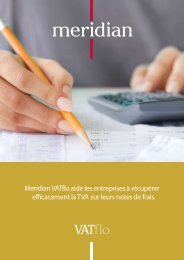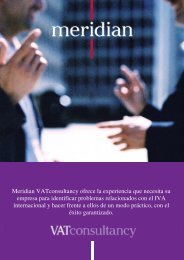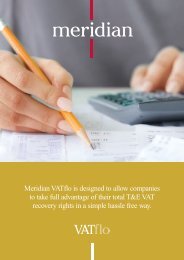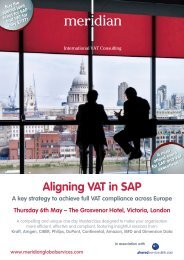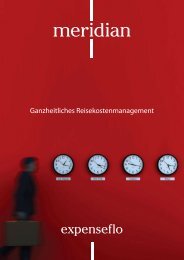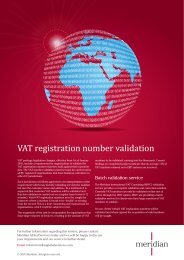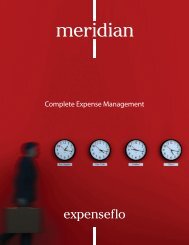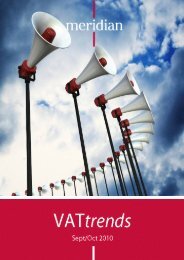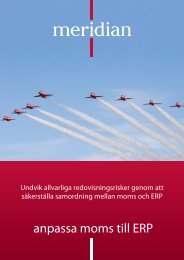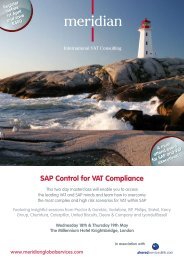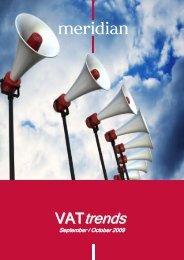country news - Meridian Global Services
country news - Meridian Global Services
country news - Meridian Global Services
Create successful ePaper yourself
Turn your PDF publications into a flip-book with our unique Google optimized e-Paper software.
VATttrreennddss<br />
Trusted Partner of the World’s Largest Companies<br />
JJuullyy//AAuugguusstt 22000099
COUNTRY NEWS<br />
BELGIUM<br />
Special rules for event, trade show and<br />
merchandising 1<br />
New rules have been implemented by decision n° E.T.<br />
116547. They foresee a derogation to the rules laid<br />
down in circular AFER n° 4/2003, point 85.<br />
The revised rules apply to the following taxable<br />
persons:<br />
- Organisers, of events, trade shows and<br />
exhibitions, where these are not established in<br />
Belgium<br />
- Participants, at events, trade shows and<br />
exhibitions, where these are not established in<br />
Belgium<br />
- Intermediaries, specialised in merchandising<br />
and that participate in events, and who are not<br />
established in Belgium<br />
Under the old rules 2 , the above taxable persons were<br />
exempted from VAT the obligation to register for VAT<br />
in Belgium where they only occasionally carried out<br />
taxable supplies in relation to events in Belgium. Point<br />
85, b) of circular AFER n °4/2003 has been now<br />
changed.<br />
Therefore, taxable person carrying taxable<br />
transactions in Belgium will have to register for VAT,<br />
even where there are only occasional event-type<br />
services. Businesses must inform the Belgian<br />
Authorities (Bureau Central de TVA) of the<br />
commencement of their activities, and regular VAT<br />
registration must be sought, subject to the domestic<br />
rules.<br />
However, taxable businesses falling within the above<br />
specifications will not be required 3 to file monthly or<br />
quarterly VAT returns. Instead, they will be asked to<br />
submit a “specific VAT return for events,<br />
1 Decision E.T 116547<br />
2 Point 85, b), circular AFER n °4/2003<br />
3 As laid down by article 53§1,2° of the VAT code<br />
trade shows and merchandising”. This is a special<br />
form, which cannot be submitted electronically.<br />
The VAT return must be filed annually, when the<br />
annual net turnover is less than EUR100,000, and not<br />
later than 31 January of the following year. The return<br />
must be filed bi-annually where the turnover is above<br />
this threshold.<br />
Please note that this rule came into force with effect<br />
from 1 July 2009, and that taxable businesses who<br />
obtained a specific authorisation not to VAT register<br />
under the old rules, but that have events that will be<br />
held after 01 July, will be contacted by the Belgian<br />
Authorities in order to comply with the new rules and<br />
will be asked to seek a VAT registration in Belgium.<br />
Introduction of VAT<br />
BURUNDI<br />
With effect from 1 July 2009 VAT has been introduced<br />
in Burundi. The new VAT system replaces the<br />
previous GST system, which operated a sales tax rate<br />
of 17%. The new standard rate of VAT is 18%.<br />
The main features of this new VAT system are as<br />
follows:<br />
- Taxable transaction: Any delivery of goods or<br />
services for consideration by taxable persons<br />
- Taxable person: Any person (private individual<br />
or company) who is carrying out taxable<br />
transactions, and whose turnover reaches a<br />
threshold set by the Ministry of Finance<br />
- Rates: the main rate is 18%<br />
- Exports: Subject 0%<br />
- Exemptions: there is a list of exempted goods<br />
and activities that is similar to the list provided<br />
by The EU Principal VAT Directive<br />
2006/112/EC (Articles 131 and 135)<br />
- Deductions: the deduction is operated via an<br />
offset mechanism<br />
- VAT refunds are possible for tax credits<br />
2
COUNTRY NEWS<br />
Introduction of VAT (cont.)<br />
BURUNDI<br />
Any taxable person who is not established in Burundi<br />
needs to have a fiscal representative in order to be<br />
able to carry out taxable transactions in Burundi and<br />
charge VAT.<br />
Please contact your local <strong>Meridian</strong> sales<br />
representative if you wish to have more information on<br />
this new VAT system.<br />
Standard VAT increase<br />
CROATIA<br />
With effective from 1 August 2009, Croatia increased<br />
the standard VAT rate by 1%, bringing the new rate<br />
from 22% to 23%. This measure has been taken in<br />
order to boost revenues and help the economy.<br />
Furthermore, a reduced rate of 6% applies to mobile<br />
phone revenues.<br />
Measures for registrations of non-established<br />
traders<br />
Croatia will introduce the possibility for nonestablished<br />
traders to register for VAT purposes in<br />
Croatia.<br />
<strong>Meridian</strong> will keep you updated in relation to the<br />
details. If you require assistance with this, or wish to<br />
register in Croatia, please contact us via the usual<br />
channels.<br />
CZECH REPUBLIC<br />
Monthly and electronic submission of EC sales list<br />
With effect from 1 January 2010, as a general rule EC<br />
Sales lists have to be submitted in electronic form on a<br />
monthly basis. This rule applies to both goods and<br />
services lists.<br />
These changes are part of the implementation of the<br />
2010 VAT Package. Quarterly taxpayers will also be<br />
obliged to submit the EC Sales lists on a monthly<br />
basis.<br />
However, taxpayers that provide only services for<br />
which the new EC sales lists for services have to be<br />
submitted, the period remains unchanged, and will<br />
depend on their VAT return period (monthly/quarterly).<br />
EC sales lists for services have to be filed where a<br />
business provides services across borders to other EU<br />
taxable persons for which the recipient is liable to<br />
account for VAT under the reverse charge rules.<br />
The EC sales lists will have to be submitted in<br />
electronic format, and must be signed with an<br />
advanced electronic signature based on a qualified<br />
certificate.<br />
DENMARK<br />
Amendments to the VAT act<br />
The Danish Parliament has recently accepted a<br />
legislative proposal, which will significantly change the<br />
VAT treatment of supplies exempt from VAT.<br />
Under the current VAT rules, services consisting of the<br />
management of immovable property, the supply of<br />
new buildings (a building is regarded as new until five<br />
years after completion), and building land are exempt<br />
from VAT.<br />
With effect from 1 January 2011, the VAT exemption<br />
will be abolished, and the supply of the above items<br />
will be subject to VAT at the standard rate of 25%.<br />
Moreover, from 1 January 2011 services of travel<br />
agents, which are currently exempt from VAT without<br />
credit, will become taxable under the tour operators<br />
margin scheme.<br />
If your business may be affected by the above, please<br />
do not hesitate to contact <strong>Meridian</strong> if you require<br />
assistance with the new rules.<br />
3
COUNTRY NEWS<br />
DENMARK<br />
Deferral of VAT payments extended to December<br />
2009<br />
Due to the continuing financial crisis, the Danish<br />
government has recently passed a proposal extending<br />
the deferral of VAT payments.<br />
The new deferral rule applies to both the due date of<br />
the payment and the filing date of the VAT returns for<br />
periods from August 2009 to December 2009.<br />
As a consequence, businesses paying VAT on a<br />
monthly or quarterly basis are allowed to defer their<br />
VAT payment by 30 days (e.g. companies paying VAT<br />
monthly for August 2009, which is due by 25<br />
September, are allowed to postpone payment to 13<br />
October 2009).<br />
For small businesses paying VAT every half-year, the<br />
payment for the second half of 2009 are deferred by<br />
six months.<br />
ESTONIA<br />
Increase in standard VAT rate<br />
The standard VAT rate in Estonia has changed from<br />
18% to 20% with effect from 1 July 2009.<br />
The new VAT rate must be used for taxable events<br />
dated on or after 1 July 2009. If payment has been<br />
made for goods and services on or after 1 July, or<br />
goods or services are supplied on or after 1 July 2009,<br />
the new VAT rate applies.<br />
Deposit invoices that are issued before 1 July 2009,<br />
but the actual payments are received on or after 1<br />
July, will also be subject to the new VAT rate.<br />
The reduced VAT rate of 9% applicable to books,<br />
medical products, hotel accommodation and periodic<br />
publications remains unchanged.<br />
Submission of VAT returns in electronic format<br />
Prior to 1 January 2009 it was up to taxable persons to<br />
decide if they want to submit their Estonian VAT return<br />
form (KMD) in paper form or electronically.<br />
Following a regulation of the Estonian Ministry of<br />
Finance of 9 December 2008, which amends the<br />
instructions for completion of VAT returns, the KMD<br />
must be submitted in electronic format if a person has<br />
been liable for VAT for at least 12 months.<br />
This applies only to the KMD forms filed on or after 1<br />
January 2009.<br />
This means that from 2009 the form KMD may be<br />
submitted in paper format only if a person has been<br />
liable for VAT for a shorter period than 12 months.<br />
After 12 months the form KMD must be submitted in<br />
electronic format.<br />
FRANCE<br />
Implementation of the reduced rate for restaurant<br />
and catering services<br />
The reduced rate of 5,5% for restaurant and catering<br />
services applies since 01 July 2009. On 30 June 2009,<br />
the French Administration published a six page<br />
instruction (Bulletin des Impôts N° 65, 3 C-4-09) that<br />
comments on and gives the guidelines for the<br />
implementation of the reduced rate, which does not<br />
apply to alcoholic beverages. These remain taxed at<br />
the standard rate of 19,6%.<br />
The general directorate for competition policy,<br />
consumer affairs and fraud control (DGCCRF) has<br />
made an assessment and observations that three<br />
weeks after the implementation of the reduced rate,<br />
only half of the restaurants have decreased their<br />
prices. The management of the implementation of the<br />
VAT savings to consumers will be further controlled<br />
and verified, even though there cannot be any<br />
sanctions from the government against service<br />
providers who decide not to decrease their prices.<br />
4
COUNTRY NEWS<br />
FRANCE<br />
Implementation of the reduced rate for restaurant<br />
and catering services (cont.)<br />
However, it is expected that consumers will act as<br />
arbitrators by choosing to consume in the premises of<br />
service providers that have kept their promises of<br />
decreasing their prices.<br />
Reverse charge of VAT: Penalty of 5% of deductible<br />
VAT for omission of declaration of reverse charge<br />
on local returns.<br />
If a taxpayer has omitted to declare an amount of VAT<br />
for which he had to apply the reverse charge on his local<br />
French VAT return, the administration cannot impose<br />
additional tax assessments if all the conditions to deduct<br />
the VAT are met. However, it can apply a penalty of 5%<br />
of the amount of the deductible VAT, which was omitted<br />
as per article 1788 A 4 of the French Tax Code.<br />
The French Authorities want to achieve a measured<br />
application of the Law and therefore they will not apply<br />
this penalty to taxpayers who voluntarily lodge an<br />
amended VAT return previous to the Administration<br />
taking any action (for example a VAT audit).<br />
Rescrit N° 2009/9 (RC) dated 17 February 2009, which<br />
has been further updated in June 2009, details the<br />
conditions under which a tax payer can avoid the<br />
application of the penalty by voluntarily lodging an<br />
amended VAT return.<br />
All French taxpayers and non-established businesses<br />
registered for VAT purposes should therefore ensure<br />
that the receipt of reverse charged supplies of goods<br />
and services is correctly accounted for in their VAT<br />
returns.<br />
Specific regime for travel agents, position of tour<br />
operators, licences and agreements of travel agents<br />
The French Administration was asked whether for VAT<br />
purposes the specific regime for travel agencies is solely<br />
applicable to travel agents who own a license or a<br />
specific agreement.<br />
The French administration held that per section E of<br />
article 266 of the French Tax Code, companies that<br />
act in their own name towards a client, and use<br />
services rendered by third parties in order to provide<br />
the travel services do fall under the regime of travel<br />
agents. The nature and the conditions of the<br />
realisation of the operation apply, regardless of owning<br />
a specific administrative authorisation, such as a<br />
license or an agreement.<br />
Therefore, any business engaged in the provision of<br />
travel services, may be required to apply the tour<br />
operators margin scheme.<br />
This decision by the French Authorities follows the<br />
principles applied by the ECJ in case of Madgett &<br />
Baldwin (C 308/96 and C 94/97 dated 28 October<br />
1998).<br />
GERMANY<br />
Status of declarant for import purposes<br />
This information is relevant to non-EU businesses<br />
importing goods into Germany as both the importer of<br />
record and as the declaring party.<br />
In accordance with an internal regulation introduced by<br />
the German customs authorities, the declarant of<br />
goods entering into free circulation into Germany and<br />
originating from outside the territory of the Community<br />
has to be a company established in Germany, or in<br />
another EU Member State. This regulation takes<br />
immediate effect.<br />
In order to successfully clear goods through German<br />
customs, it is no longer possible for the importer of<br />
records (if it is a non EU company) to also be the<br />
declaring party.<br />
These changes have no impact on the importer of<br />
records, who is the only party involved and has the<br />
right to recover the import VAT incurred (subject to<br />
normal rules).<br />
5
COUNTRY NEWS<br />
GERMANY<br />
Status of declarant for import purposes (cont.)<br />
If your company is a non-EU based company<br />
importing goods into Germany and until now was also<br />
the declaring party, please contact your Client service<br />
manager for more details regarding how to proceed in<br />
the import procedure in the future.<br />
Monthly submission of EC sales list<br />
The German VAT Act will be subject to several<br />
amendments, which will be valid with effect from 1<br />
January 2010. One of the most important changes will<br />
be that European Sales lists will have to be submitted<br />
on a monthly basis.<br />
The new requirement will apply, however, only for<br />
businesses making supplies that exceed € 50,000 per<br />
quarter.<br />
It remains unclear at this point, what will be the date<br />
when the monthly submission will have to be<br />
submitted.<br />
HUNGARY<br />
Hotel and holiday accommodation subject to the<br />
reduced rate of 18%<br />
With effect from 8 July 2009, hotel and holiday<br />
accommodation are both liable to the reduced rate of<br />
18% Hungarian VAT.<br />
Before the amendments to the Hungarian VAT law,<br />
hotel and holiday accommodation were subject to the<br />
standard VAT rate.<br />
New VAT rate in Lithuania<br />
LITHUANIA<br />
With effect from 1 September 2009 the standard VAT<br />
in Lithuania increased from 19% to 21%.<br />
The higher rate does not apply to cigarettes and<br />
manufactured tobacco, provided that these products<br />
are marked with excise duty stickers, which were<br />
ordered until 1 September 2009. If this condition is not<br />
met, tobacco products should be subject to the new<br />
21% VAT rate.<br />
Additionally, according to the latest changes in the<br />
Lithuanian VAT Law, the reduced VAT rate of 9% will<br />
apply to the supply of heat and hot water. The<br />
application of the reduced VAT rate is a temporary<br />
measure and will be in force from 1 September 2009<br />
to 31 August 2010. It remains to be seen what will<br />
happen to this rate after this expiry date.<br />
SLOVAKIA<br />
Increase of VAT registration threshold<br />
With effect from 1 July 2009, the turnover threshold<br />
from which a Slovak established business must<br />
register for VAT was increased from EUR 35,000 to<br />
EUR 49,790.<br />
Slovak taxable persons, who exceeded threshold of<br />
EUR 35,000 by 30 June 2009, but did not exceed EUR<br />
49,790, are not obliged to file an application for VAT<br />
registration. However, they are still allowed to apply for<br />
a voluntary registration.<br />
Proof of export – Electronic single administrative<br />
document<br />
As of 1 July 2009, the Slovak customs authorities<br />
introduced an electronic system for customs<br />
procedures in relation to the exportation of goods.<br />
Since this date, the single administrative document<br />
(SAD) for the export of goods is issued in electronic<br />
format only.<br />
For VAT purposes, in order to avail of the exemption<br />
from VAT in relation to the export of goods to third<br />
countries, a valid SAD has to be retained by the<br />
exporter. The SAD provides evidence from Slovak<br />
Customs that the goods left the territory of the<br />
European Union. The Slovak Tax Directorate informed<br />
that SADs in electronic format stored on data carrier<br />
must be accepted as proof of export.<br />
6
COUNTRY NEWS<br />
SWITZERLAND<br />
Potential increase of VAT rates<br />
The Swiss Federal Council is seeking opportunities to<br />
improve the financial situation of the Swiss social<br />
security system. One of the options is to temporarily<br />
increase the VAT rates. However, an obligatory<br />
referendum is required, which will be held in<br />
September 2009 in order to approve the increase of<br />
the VAT rates.<br />
If the VAT increase passes through the referendum, all<br />
three VAT rates will change with effect from<br />
01.01.2010 and will be valid for seven years until<br />
31.12.2016. The VAT rates are to be increased as<br />
follows:<br />
- standard VAT rate to increase from 7.6% to<br />
8%;<br />
- reduced VAT rate to increase from 2.4% to<br />
2.5%; and<br />
- special reduced VAT rate to increase from<br />
3.6% to 3.8%.<br />
Unfortunately, there will be a very short time frame to<br />
implement the amended VAT rates into the companies<br />
IT systems, invoicing templates, contracts etc.<br />
<strong>Meridian</strong> is ready to support you in the implementation<br />
process and therefore please contact your client<br />
service manager or your contact at <strong>Meridian</strong> should<br />
you need any assistance in this matter.<br />
New VAT law applies from 1 January 2010<br />
The Swiss Tax Authority, “the ESTV”, published<br />
guidelines to all Swiss taxpayers in relation to the new<br />
Swiss VAT Law (“nMWSTG”). The law is dated 12<br />
June 2009. The new legislation replaces the old<br />
MWST dated 2 September 2009, and comes into<br />
effect from 1 January 2010.<br />
The main aim of the revised legislation was to simplify<br />
the VAT system and to make it more business friendly<br />
in order to decrease the administrative costs for<br />
businesses.<br />
The following is a summary of the most important<br />
changes, which may have an impact on taxpayer’s<br />
VAT compliance obligations, and may require changes<br />
to the accounting systems and the way VAT is applied.<br />
1. VAT Registration Threshold (Art. 10,11 and 12<br />
nMWSTG)<br />
The old VAT registration thresholds of CHF75,000 and<br />
CHF250,000 have been replaced by a single turnover<br />
threshold of CHF 100,000. Any business that has not<br />
achieved this limit is exempt from VAT. The threshold<br />
of CHF 150,000 continues to apply to sport clubs and<br />
non-for-profit organisations.<br />
Every taxable person has the right to register for VAT<br />
purposes voluntarily, even where no sales have yet<br />
been made.<br />
Businesses can inform the ESTV in writing by 31<br />
January 2010 if they wish to deregister from Swiss<br />
VAT in case their turnover in 2009 is below the CHF<br />
100,000 threshold.<br />
2. Deduction of VAT (Art. 28 nMWSTG)<br />
The new legislation follows the principle that any VAT<br />
incurred in the course and furtherance of taxable<br />
activities should be deductible. Therefore, a<br />
deduction of 50% of the VAT incurred on<br />
subsistence (meals, drinks) is no longer required.<br />
100% can be claimed from 1 January 2010.<br />
3. Self supplies<br />
Self supplies will be accounted for by adjusting the<br />
VAT reclaimed on the purchase of such goods or<br />
services. Therefore, there is no output VAT to be<br />
declared going forward.<br />
4. Changed rules in relation to the place of supply of<br />
services to align these with EC Law<br />
Swiss VAT legislation will align the rules in relation to<br />
the Business-to-Business supplies of services with the<br />
new Place of Supply rules for services in the EU,<br />
which means that the basic place of supply rule will be<br />
the place where the customer has established his<br />
business.<br />
Should you require further assistance with the new<br />
legislation, please contact <strong>Meridian</strong>.<br />
7
COUNTRY NEWS<br />
SWITZERLAND<br />
New status of bonded warehouses<br />
With the introduction of the new customs law and the<br />
changed VAT law on 1 May 2007 the status of bonded<br />
warehouses changed as of 1 May 2009 after the<br />
expiration of the transitional period.<br />
This means that bonded warehouses are now<br />
considered as Swiss territory from a VAT point of view.<br />
Bonded warehouses thus have the same status as<br />
open customs warehouses. The changes resulting<br />
from this are as follows:<br />
- <strong>Services</strong> provided in a bonded warehouse<br />
are now considered as services provided in<br />
Switzerland and may cause a registration<br />
liability, even if these services are VAT<br />
exempt<br />
- The simplified import procedure no longer<br />
applies when the goods are transferred into<br />
free circulation in Switzerland.<br />
- <strong>Services</strong>, which are not ancillary to transport<br />
services and are considered as provided in<br />
the bonded warehouse, have to be taxed at<br />
the standard rate.<br />
All other regulations regarded bonded warehouses<br />
remain unchanged.<br />
THE NETHERLANDS<br />
Exempt services - Fund management/<br />
administration services<br />
According to a recent decision in the Netherlands, the<br />
following services should be exempt from VAT:<br />
- Management of immoveable property<br />
- Management of liquid assets<br />
- Administrative services provided to<br />
investment funds<br />
If your business is engaged in the provision of fund and<br />
other management services to which an exemption without<br />
the right to deduct the VAT may apply, it is important that<br />
professional guidance is sought to ensure that the correct<br />
VAT treatment applies.<br />
Reclaim opportunity for tours operators/ travel<br />
agencies<br />
A recent judgement of the Dutch Supreme Court now<br />
allows VAT refunds to Tour Operators/Travel<br />
Agencies.<br />
Tour operators only have to pay VAT on their margin,<br />
and in the Netherlands this was never implemented<br />
into local legislation.<br />
Instead, this ruling was covered by a formal decree<br />
under the Dutch 'tour operator scheme’ and the<br />
decision from the Dutch Supreme Court held this an<br />
inappropriate way of implementing the EU VAT<br />
Directive.<br />
Therefore, tour operators not established in the<br />
Netherlands can now choose to ignore this Dutch 'tour<br />
operator scheme’, effectively enabling the regular<br />
rules from the Dutch VAT Act to be applied.<br />
Tour operators not established in the Netherlands will<br />
now be entitled to deduct all Dutch input VAT incurred<br />
in the furtherance of their business. This would include<br />
items such as transport or hotel costs. VAT on food<br />
and drinks cannot be deducted.<br />
TURKEY<br />
Increase in VAT rate on certain restaurant services<br />
With effect from 15 July 2009, 18% of Turkish VAT is<br />
applicable to the restaurant services provided by firstclass<br />
restaurants, restaurants in hotels, as well as<br />
holiday villages with three or more stars.<br />
Previously, such services were liable to the lower rate<br />
of 8% Turkish VAT.<br />
If you wish to learn more about VAT recovery in<br />
Turkey, please contact <strong>Meridian</strong>.<br />
8
COUNTRY NEWS<br />
New data field for exports<br />
UNITED KINGDOM<br />
A new regulation is due to come into force on 1<br />
January 2010, which requires Member States to report<br />
the currency of a commercial invoice for trade with<br />
non-EU countries.<br />
For UK exporters, this means that the data element of<br />
box 22 on the SAD will become mandatory. However,<br />
to reduce the burden on such businesses, this change<br />
will only be required above a statistical threshold (likely<br />
to be set at £100,000) and there will be no requirement<br />
for the actual invoice value or to change the currency<br />
that the statistical value is declared (box 46). The<br />
Tariff will be amended with the full completion rules in<br />
due course.<br />
New guidelines for temporary imports<br />
HMRC have made a number of updates to Notices<br />
306 and 308 relating to temporary importations.<br />
For further information regarding this, please follow<br />
this link: Revised public Notice 306 and 308 -<br />
Temporary admission<br />
The VAT Package – Guidelines on EC sales List<br />
and information on accounting for the receipt of<br />
reverse charged services<br />
The UK VAT authorities (“HMRC”) have issued further<br />
guidance in respect of the time of supply rules for<br />
reverse charge services and filing information for EC<br />
Sales lists. These rules will apply from 1 January<br />
2010.<br />
Receipt of reverse charged supplies – time of supply<br />
rules<br />
The time of supply for reverse charge services will be<br />
when a service is performed. For continuous supplies,<br />
the tax point will be the end of each periodic billing or<br />
payment period. If a payment is made before the end<br />
of the period to which it relates, or before the end of<br />
the billing period, then that the payment date, rather<br />
than the end of the period, will be treated as the tax<br />
point.<br />
EC sales lists for services<br />
The new reduced time limits for submitting EC Sales<br />
lists are 14 days from the end of the reporting period<br />
for paper forms, and 21 days for electronic<br />
submissions.<br />
It is important to note that EC Sales lists for goods will<br />
be required on a monthly basis, if the value of intra-EC<br />
goods exceeds £70,000 in the current quarter, or any<br />
of the previous four quarters. The threshold will<br />
change to £35,000 from 1 January 2012.<br />
Where a business supplies services to another EU<br />
business, and the recipient is liable to account for the<br />
VAT under the reverse charge rules, the transaction is<br />
to be reported in a new EC sales list for services.<br />
EC Sales lists for services will be required on a strict<br />
calendar quarter basis, however, businesses can opt<br />
to submit them monthly. Businesses submitting VAT<br />
returns on a quarterly basis other than calendar<br />
quarter should note that the use of non-standard<br />
accounting periods will be withdrawn.<br />
If your business is required to revise its VAT<br />
compliance regime to implement the new rules, please<br />
contact <strong>Meridian</strong> for further assistance in relation to<br />
the The VAT Package.<br />
UK publishes guidelines on change to the<br />
standard rate of VAT to 17.5%<br />
All businesses should be aware that on 1 January<br />
2010 the standard rate of VAT will revert back to<br />
17.5% and will no longer be charged at 15%. In order<br />
to assist businesses in managing this change, HMRC<br />
have issued guidance for businesses. The guidance<br />
has a particular focus on the time of supply rules, as<br />
well as the special rules for supplies that span the<br />
change of rate.<br />
By way of example, where goods or services are<br />
supplied before 1 January 2010, but the tax point<br />
occurs after 1 January 2010 (i.e. an invoice is raised<br />
within 14 days following the basic time of supply),<br />
businesses can choose to apply the 15% rate as<br />
opposed to 17.5%.<br />
9
COUNTRY NEWS<br />
UNITED KINGDOM As the legislation was updated at short notice, HMRC<br />
will bear this in mind when considering what action to<br />
UK publishes guidelines on change to the<br />
standard rate of VAT to 17.5% (cont.)<br />
This would be of particular benefit to customers that<br />
are unable to recover their input tax in full.<br />
Alternatively, where the goods or services are supplied<br />
after 1 January 2010, but payment has been made, or<br />
an invoice has been issued before that date,<br />
businesses can choose to charge 17.5% as opposed<br />
to 15%. This would be of particular benefit to<br />
businesses that are able to recover their input tax in<br />
full.<br />
There are also certain apportionment rules that can be<br />
applied to continuous supplies of services that span<br />
the change in rate.<br />
In light of this change, businesses will need to consider amending their current invoicing and accounting<br />
systems to take into account the increase in VAT rate.<br />
If your business requires assistance in relation to this,<br />
please contact your usual <strong>Meridian</strong> advisor.<br />
Zero rating of carbon credits to prevent fraud<br />
New legislation to zero-rate the supply of emission<br />
allowances and transferable units within the UK was<br />
introduced with effect from 31 July 2009.<br />
The purpose of the new measures is to tackle Missing<br />
Trader Intra-community VAT fraud, which arises where<br />
standard-rated goods or services can be zero-rated<br />
when supplied between EU Member States.<br />
Fraudsters would sell carbon credits within the UK and<br />
charge the UK VAT. They would then disappear<br />
without passing the VAT to HMRC.<br />
The tax point for this kind of supply will be the earliest<br />
of either the transfer of title or payment. Any amount<br />
purporting to be VAT on tax invoices dated from 31<br />
July 2009 will not be recoverable as input tax.<br />
take in any case where the VAT has been charged<br />
and it should not have been.<br />
However, to prevent fraud, businesses are advised to<br />
stop paying VAT from the date the new legislation<br />
came into effect.<br />
10
EU NEWS<br />
EUROPEAN UNION<br />
Goods imported for onward IC-supplies – Relief<br />
from Import VAT<br />
On 25 June 2009, the EU Council published a new<br />
Directive modifying the rules applied to goods<br />
imported in the EU and immediately transferred to<br />
another EU member state. The new rules amend<br />
articles 22, 140 and 143 of Directive 2006/112/EC.<br />
In order to exempt goods that are imported and<br />
immediately transported or dispatched to another<br />
Member State from import VAT, the importer will have<br />
to meet the following conditions and provide to the<br />
relevant customs authorities:<br />
a) His VAT identification number in the Member State<br />
of importation, or the VAT identification number of<br />
his tax representative in this same Member State.<br />
b) The VAT identification number of the customer to<br />
whom the goods are subsequently supplied in<br />
accordance with the article 138(1), issued in<br />
another Member State, or his own VAT<br />
identification number issued in the Member State<br />
where the transport of the goods ends.<br />
c) Proof that the goods imported are intended to be<br />
despatched outside of the Member State of<br />
importation to another member state<br />
Even if the Council left some freedom to the Member<br />
State in relation to the application of the last condition<br />
(point c) these new rules should lead to a<br />
reinforcement of the conditions for the application of<br />
the exemption when the goods imported are directly<br />
moved to another Member State.<br />
Council Directive 2009/47/EC - Reduced VAT rates<br />
Council Directive 2009/47/EC of 5 May 2009<br />
amending the EU Principal VAT Directive<br />
2006/112/EC concerning reduced rates of VAT was<br />
published in the Official Journal on 9 May 2009. The<br />
Directive came into force on 1 June 2009.<br />
Under Article 106, all Members States were allowed to<br />
apply until 31 December 2010 the reduced rates to<br />
labour-intensive services listed in Annex IV of the<br />
Directive, which are the following:<br />
- Minor repairing of: bicycles, shoes and leather<br />
goods, clothing and household linen.<br />
- Renovation and repairing of private dwellings,<br />
excluding materials, which account for a<br />
significant part of the value of the service<br />
supplied.<br />
- Window cleaning and cleaning in private<br />
households.<br />
- Domestic care services such as home help<br />
and care of the young, elderly, sick or<br />
disabled.<br />
- Hairdressing.<br />
The Council of the European Union has decided to<br />
make these provisions permanent by transferring them<br />
into Annex III of the VAT Directive. Therefore, the<br />
reduced rates may still be applied going forward.<br />
Furthermore, the Directive has included two additional<br />
supplies to Annex III, to which the Member State may<br />
apply the reduced rates:<br />
1. Supply, including on loan by libraries, of books<br />
and other publications on all physical means<br />
of support such as books on electronic<br />
support.<br />
2. Restaurant and catering services, it being<br />
necessary to exclude the supply of (alcoholic<br />
and/or non-alcoholic) beverages.<br />
Lastly, the Directive also authorises the following<br />
individual Member States to apply the following<br />
reduced rates and exemptions:<br />
- Cyprus may continue to apply the reduced<br />
rate to the supply of liquid petroleum gas in<br />
cylinders.<br />
- Portugal may continue to apply the reduced<br />
rate to the toll on bridges in the Lisbon area.<br />
- Portugal may continue to apply rates lower<br />
than those applying on the mainland of Azores<br />
and Madeira.<br />
- Malta may apply an exemption with respect to<br />
the supply of foodstuffs for human<br />
consumption and pharmaceuticals.<br />
11
CASES OF INTEREST<br />
IRELAND<br />
ECJ Ruling - Treatment of public bodies<br />
Commission v Ireland: C-554/07<br />
The ECJ has ruled in against Ireland in a case<br />
concerning the VAT treatment of public bodies. The<br />
judges ruled on the Irish application of Articles 2, 9 and<br />
13 of Directive 2006/112/EC.<br />
The case, which has been broadened from the initial<br />
question, related to non-taxation of off-street car<br />
parking supplied by local government bodies. The ECJ<br />
was asked to investigate a possible distortion of<br />
competition, given the absence within Irish national<br />
legislation for provisions taxing all activities of such<br />
local bodies to avoid distortion of competition.<br />
The judgement found that Ireland has failed to<br />
correctly apply the Directive, given Ireland has merely<br />
treated such activities as taxable provided it has made<br />
specific provision within national legislation.<br />
Click link to read full text of the judgment on the<br />
Europa website.<br />
ITALY<br />
Deductibility of VAT for non-resident companies<br />
that have a fixed establishment in Italy – Ruling in<br />
ECJ case no. C-244/08<br />
Summary<br />
The ECJ ruled that Italy has failed to properly<br />
implement the Eighth or Thirteenth Directives, as well<br />
as the EU Principal VAT Directive, in regards to nonresident<br />
companies that have a fixed establishment in<br />
Italy. Input VAT should be deductible for non resident<br />
businesses, which are VAT registered and have a<br />
fixed establishment in Italy, even when the purchase of<br />
goods or services were made directly for the purpose<br />
of the business of the main establishment abroad.<br />
The case<br />
The European commission, on reviewing art 38-ter of<br />
the Italian VAT Act (DPR 633/72) regarding the refund<br />
of VAT to non-residents entities, held that the article<br />
was not compatible with the principles of the EU VAT<br />
legislation.<br />
Consequentially, infringement proceedings were taken<br />
against Italy for obliging non-resident companies to<br />
recover input tax incurred through the Eighth and<br />
Thirteenth Directive procedures, even when those<br />
companies had a VAT registration in Italy in respect of<br />
other unrelated supplies for which periodical VAT<br />
returns were submitted.<br />
The Italian authorities justified their position by stating<br />
that the purchase was made directly from the business<br />
establishment abroad and not from the Italian fixed<br />
establishment. However, the ECJ found this<br />
interpretation to be incorrect. In accordance with Art.<br />
17 of the Sixth Directive, a fixed establishment must<br />
be taken into account when determining how the<br />
refund of VAT should be made. The Court stated that<br />
the purchases made from the main business<br />
establishment and the purchases made from the fixed<br />
establishment in Italy are for the purpose of the same<br />
legal entity as they relate to the same taxable person;<br />
the two entities have the same Italian business<br />
number. For this reason, a non-resident taxable<br />
person that has a fixed establishment in an EU<br />
<strong>country</strong>, must be considered as established in that<br />
<strong>country</strong> and he can therefore deduct input VAT<br />
through the local VAT return of that <strong>country</strong>, even<br />
when the goods or services are purchased not through<br />
the fixed establishment in Italy, but directly from the<br />
place in which that entity has its principal<br />
establishment.<br />
Conclusion<br />
Any business with a fixed establishment in Italy will be<br />
affected by this ruling. No retrospective action will be<br />
required. However, going forward, Italian VAT incurred<br />
by the foreign headquarter should be reclaimed<br />
through the fixed establishment’s domestic VAT return.<br />
This may require internal processes to be changed in<br />
order to ensure that cash-flow is increased through the<br />
recovery of input VAT through the domestic VAT<br />
12
CASES OF INTEREST<br />
ITALY<br />
Deductibility of VAT for non-resident companies<br />
that have a fixed establishment in Italy – Ruling in<br />
ECJ case no. C-244/08 (cont.)<br />
returns. This is especially important to those<br />
headquarters established outside of the EU where<br />
reciprocity restrictions apply in Italy.<br />
If your business requires assistance with Italian VAT<br />
compliance, please contact <strong>Meridian</strong>, where your team<br />
of designated Italian VAT specialists can assist you.<br />
EGN BV – Filiale Italiana - ECJ Case no. C-377/08:<br />
Deductibility and refunds of input VAT for “out of<br />
<strong>country</strong>” telecommunication supplies<br />
Summary<br />
The European Court of Justice (“ECJ”) has declared<br />
that Art. 17(3)(a) of Directive 77/388/CEE has to be<br />
interpreted in a way that the supplier of<br />
telecommunication services established in Italy, as the<br />
one described in the case C-377/08, has the right to<br />
deduct or reclaim input VAT in Italy for<br />
telecommunication services supplied to a taxable<br />
person established in another EU Member State, if the<br />
supplier would have the right to deduct VAT on such<br />
upplies had these been made in Italy under domestic<br />
VAT legislation.<br />
The case<br />
The Italian Supreme Court (Corte Suprema di<br />
Cassazione) asked for a preliminary ruling on the<br />
question how to interpret Art. 9(2)(e) of Directive<br />
77/388/EC in relation to the deduction of VAT incurred<br />
in relation to such supplies, where the place of supply<br />
is effectively outside of Italy.<br />
The opinion of the EU judges is that the right to deduct<br />
VAT must be granted for both the activities “materially<br />
carry out” outside Italy, and also for the ones that,<br />
based on the place of supply rule criteria, are<br />
“considered to be carried out” outside of Italy.<br />
In case no C-377/08, an Italian subsidiary of a Dutch<br />
company supplied telecommunications services to<br />
another Irish partner.<br />
The services were originally bought from Italian<br />
suppliers, and for that reason the Italian affiliated<br />
company paid input VAT on these services.<br />
Because the services were rendered to an Irish entity,<br />
these services were considered to be “outside of the<br />
scope of Italian VAT” for the lack of the territoriality<br />
element (in accordance with art 7, paragraph 4, letter<br />
(e) of the Italian VAT Act (DPR 633/72).<br />
The Italian entity was therefore in a constant VAT<br />
repayment position and applied for refund of this VAT,<br />
which was rejected based on the position that there<br />
were not the legal grounds that would allow the<br />
taxpayer to execute his right to deduct the VAT.<br />
However the local Tribunal Court (Commisione<br />
Tributaria Provinciale) agreed with the claimant on the<br />
grounds of article 19, paragraph 3, letter b, of the<br />
DPR633/72, which grants the refund of VAT for these<br />
activities carried out in another <strong>country</strong>, which would<br />
be eligible for refund of VAT if they had arisen in Italy.<br />
The Italian appeals court subsequently overturned this<br />
ruling, stating that the expression “activities carried out<br />
in another <strong>country</strong>” refers only to the activity<br />
“materially carry out abroad” and not to the ones that<br />
are only extraterritorial for conventional reasons,<br />
or for a choice of the legislator.<br />
On grounds of interpretation issues, the Higher Court<br />
of Appeal referred to the case to the ECJ.<br />
The ruling<br />
The ECJ ruled that the claimant has the right to deduct<br />
this VAT in relation to telecommunication services<br />
provided to an undertaking that has its principal place<br />
of establishment in another Member State as the right<br />
to deduct would have arisen had the place of supply<br />
been in Italy.<br />
13
CASES OF INTEREST<br />
POLAND<br />
Poland referred to ECJ for incorrect application of<br />
VAT rules on certain international passenger<br />
transport services<br />
The Commission has recently referred Poland to the<br />
European Court of Justice for the misapplication of the<br />
VAT rules regarding international passenger transport<br />
services.<br />
In June 2008 the Commission issued to the Polish<br />
government a reasoned opinion concerning this<br />
matter. Due to the fact that Poland has not addressed<br />
this issue and has not amended its national legislation,<br />
the Commission has decided to refer the case to ECJ.<br />
Pursuant to Council Directive 2006/112/EC, the place<br />
of supply of transport services (other than intra-<br />
Community transport of goods) shall be the place<br />
where the transport takes place, proportionately to the<br />
distances covered. In principle, the VAT due in terms<br />
of the distance covered in each Member State should<br />
be declared in the relevant Member State’s local VAT<br />
return.<br />
Poland has implemented into its national VAT<br />
legislation, without prior consultations with the EU<br />
Commission, special provisions regarding levying VAT<br />
on the cross-border passenger transport services occasionally rendered by operators of coaches registered abroad. These are as follows:<br />
- VAT due is collected at the Polish border;<br />
- 7% of VAT is levied from the tax base equal to<br />
PLN 285 per each passenger;<br />
- the transport company has no right to recover<br />
any Polish input VAT incurred.<br />
<strong>Meridian</strong> will inform its readers on any progress made<br />
in the above ECJ case.<br />
SPAIN<br />
Ruling V2404-08 from Spanish VAT authority<br />
regarding gift cards<br />
In this judgment, the Spanish Authority has ruled<br />
concerning the treatment of Gift Cards sold by the<br />
supplier and which can be used to buy a range of<br />
products in different supplier’s shops.<br />
The Spanish Authority has deemed that consideration<br />
for gift cards are in actuality pre-payments of a lump<br />
sum for items that, in so far as they are not clearly<br />
identified, and which could be bought in different<br />
supplier’s shops, are not subject to VAT. This is<br />
because at the time of sale of the gift card, there is no<br />
direct link to a supply.<br />
However, when the customer uses the gift card to buy<br />
any goods at the supplier’s shop, then the VAT<br />
becomes chargeable and it would be due over the total<br />
cost of the goods, although the means of payment are<br />
both cash and Gift card.<br />
Therefore the Spanish Authority have applied the<br />
same approach as that of the EC Court in the case of<br />
BUPA Hospitals Ltd concerning the prepayments of<br />
lump sums for supplies not yet identified at the time of<br />
the payment.<br />
14
<strong>Meridian</strong> <strong>Global</strong> <strong>Services</strong> Head Office<br />
Tallaght Business Park,<br />
Tallaght, Dublin 24,<br />
Ireland<br />
Tel: 353 14590 500<br />
Fax: 353 14590 540<br />
Website: http://www.meridianglobalservices.com/<br />
Contact Editorial Committee:<br />
Vattrends@meridianglobalservices.com<br />
All content, interpretations opinions and suggestions contained within this<br />
publication are made based on the information to hand at the time of<br />
publication and are those of VATtrends editorial committee and should in no<br />
way be taken as definitive opinions. Should you require a specific opinion of<br />
how any information contained within may impact your business please<br />
contact your local <strong>Meridian</strong> representative directly.<br />
Barcelona Belgrade Berlin Bogota California Chicago Dublin Hamburg<br />
Istanbul London Lyon Milan Munich Napoli New York Nicosia Osaka<br />
Oslo Paris St Petersburg Porto Sao Paolo Seoul Stockholm Tokyo<br />
Toronto<br />
Trusted Partner of the World’s Largest Companies




